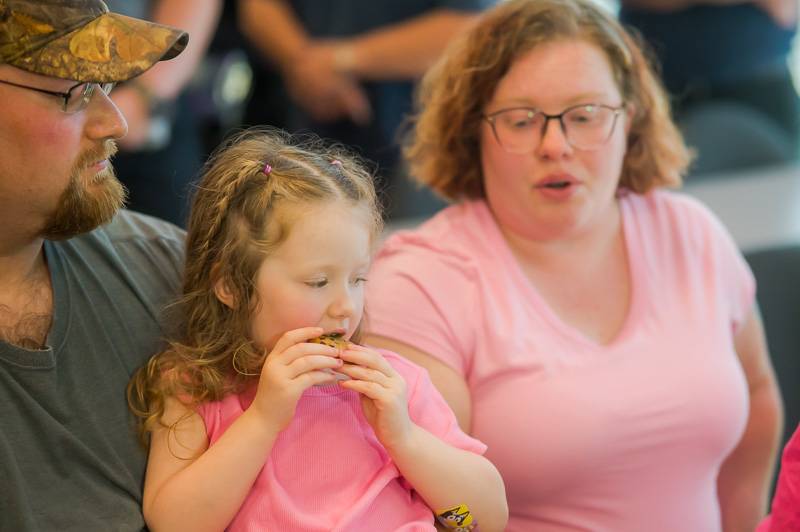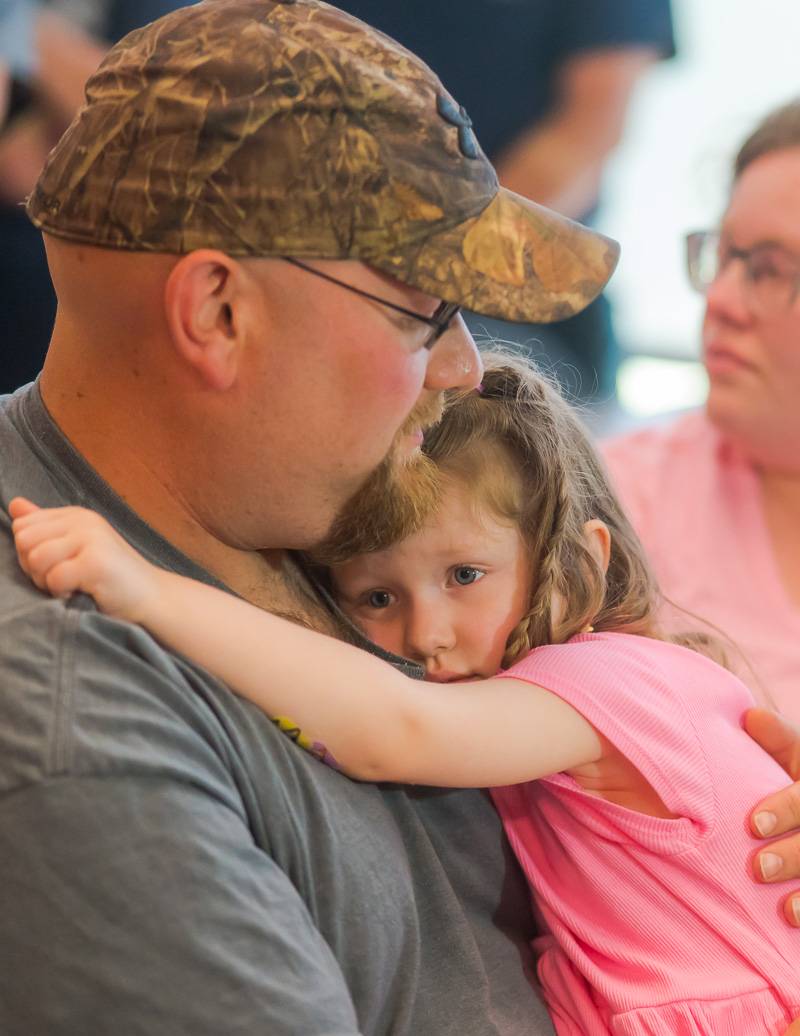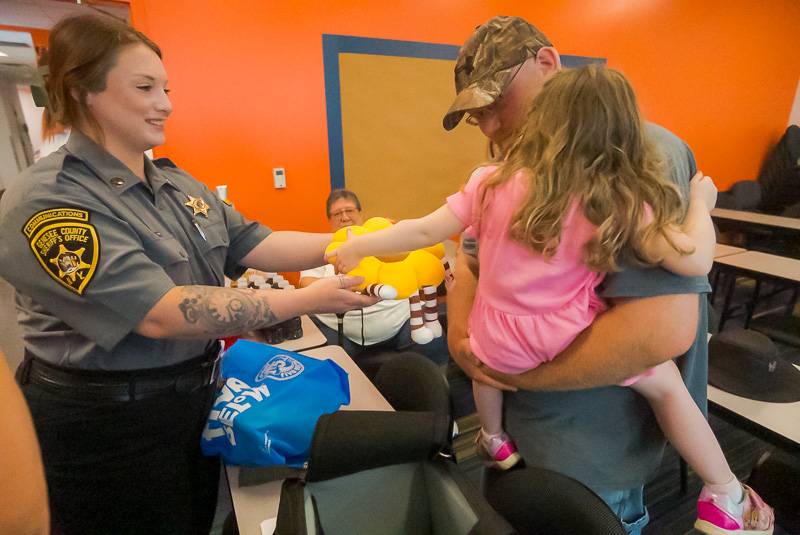
Photo by Howard Owens.
As John Durand, safety officer for the Byron Fire Department, peeked in the window of a Mercy EMS ambulance in the early morning of June 11, he saw something that lifted his spirits.
"We can see her in the back of the ambulance, and I can see her little smile. Life got better real fast after that. It was the prettiest thing I've seen in a long time," Durand said.
Daysee Burr, who earlier hadn't been breathing and barely had a pulse, was alive and about to get a Mercy Flight ride to Strong Memorial Hospital, where she could get the emergency care she needed for complications from tonsil and adenoid surgery.
Anyone who heard the scanner call at 2 a.m. would have heard the concern and worry in the dispatcher's and responder's voices as the call escalated from "three-year-old child vomiting blood" to "child not breathing."
CPR instructions were being given, a dispatcher told first responders.
Byron Fire and Ambulance, along with State Police, responded.
Mercy Flight was called. Troopers set up a landing zone. Elba's fire chief also responded and acted as ground contact.
Daysee's father, Daniel Burr, tried breathing into his child's mouth but admitted during a gathering at Mercy EMS's Genesee County headquarters on Call Parkway in Batavia that he doesn't really know CPR. Long-time family friends Micheal and Cheyenne have been staying with the Burr's for the past month or so. They have military experience and stepped in to assist.
"They started taking control because we were panicking," Burr said. "We were, you know, we don't know CPR or nothing like that. We were really panicking and they just took control, calm, collected, and got stuff done the way it had to be done at that point.
Ashley Gurgel was the dispatcher providing instructions.
"They were listening to dispatch," said Makenzie Burr, Daysee's mother, "listening to everything that she was telling us to do -- make sure her head is tilted back, you know. If she starts coughing, turn her on her side and make sure her airway is clear. If she does cough anything up, we've got to get as much of it out as possible before lying her on her back."
Durand added, "The anatomy of three-year-olds, their airway are very small. It doesn't take too much to block it."
It was Makenzie who immediately called 9-1-1 when she recognized the severity of the situation.
"The first thing that came to my mind was we can't go through another child's funeral," Makenzie said. "We have already lost our oldest daughter. There was no way we could go through another funeral for one of our children. We were just praying to God that, you know, help her, help her stay with us until she can get the proper help and care that she needs."
Daysee had her tonsils and adenoids removed on June 4. After getting back home, according to Mackenzie said, she looked pale and she wasn't eating or drinking much. She coughed up blood the first time on June 10.
"Seeing your child cough up blood is absolutely terrifying," Makenzie said. "So we called, and the on-call doctor called us back, and said it's normal to last about two to three minutes. But if it happens again, something is wrong."
Makenzie said she and her husband monitored their little girl the rest of the day.
At about 2 a.m., she got up and asked for a popsicle.
"As she got up and moving, we were standing in our kitchen, and she projectile vomited," Makenzie said. "I called 911, and that started the process of telling me what to do, and she got everyone there."
Senior Dispatcher Michael Sheflin said it was clear quickly that if there is any such thing as a routine emergency call, this call wasn't routine.
Gurgel was giving instructions, but it was apparent something troubling and serious was going on.
"Ashley did a great job staying with mom and the people there," Sheflin said. "I just supported her by dispatching the fire departments and helicopter, and the State Police stepped up on their own and responded, which makes our life a little bit easier when people pitch in and do what they can."
Both troopers who responded have young children, said Trooper Mike Machniak.
"I've got a three-year-old, and he's got a six and a 10-year-old," Machniak said. "When you hear a call like that, it doesn't matter; you're going to get there, you know. At that time, speed and getting there (is important). We may all wear a different uniform but at that point, we care about the child, about the person. They're talking about being a big team. That's all it's about."
Durand was sleeping and happened to wake up just before the call came in.
"I looked at my clock and said, "It's been a long time since we've had a late night call, and my head hit the pillow," Durand said. "As I'm getting dressed and getting ready to go, it goes out with the breathing part, so we're trying to get there without hitting too many deer late at night."
Durand had forgotten, he said, that the State Police have their own helicopter, so troopers are trained to set up landing zones, and that is exactly what Machniak and his partner did for Mercy Flight.
They found a good spot and helped carry the litter back and forth," Durand said. "So it all worked, even though we were all different units. It worked very well together, the way it was designed to work."
Daysee is doing much better, Makenzie said. She spent most of three days in the hospital (three different trips) being monitored, ensuring she stayed hydrated, and was getting the medication she needed.
Asked at what point in the process, she and her husband felt relieved that her child was out of the woods.
"We still don't," Makenzie said. "Right now, she's going through trying to get her iron back up. Once she is able to run around and play like she normally is, that's when we'll feel great."


Photo by Howard Owens.

Photo by Howard Owens.
